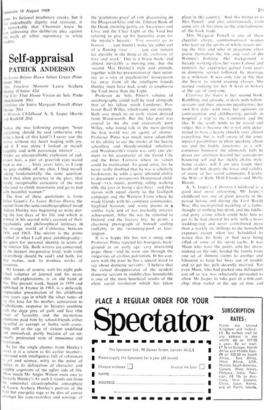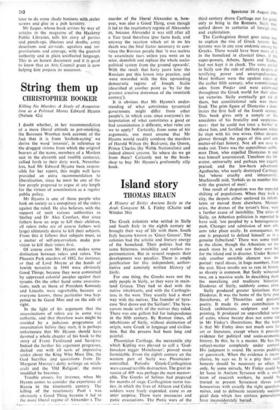Self-appraisal
PATRICK ANDERSON
fo Leave Before Dawn Julien Green (Pete' ,)ss en 38s) his Timeless Moment Laura Archera (Chatto 42s) he City That Shone Vivian de Solo Pinto Hutchinson 50s) climbing the Stairs Margaret Powell (Peter Davies 30s) I Hamm Childhood A. S. Jasper (Barrie Rockliff 20s) otice the two following passages. 'Since ..erything should be said (otherwise why ,:ite a book of this kind?) I never saw the mirror without my heart leaping with joy, and if I was alone I looked at myself lengthily and with passionate interest' . . 'Under an uncontrollable explosion of red- brown hair, a pair of greenish eyes stared back at me . . . Sixty years later, as I rasp the grey stubble off my chin, I find myself asking fundamentally the same question. Am I that alien presence in the glass, that hardly recognisable caricature of the man who used to climb mountains and go to bed with beautiful women?'
The first of these quotations is from Julien Green's To Leave Before Dawn, the second from the semi-autobiographical novel Aldous Huxley was beginning to write dur- ing the last days of his life and which is printed in his second wife's account of their psychedelic and philosophical intimacy in the strange world of California between 1956 and 1963. The mirror is the prime symbol of what I call pure autobiography: the quest for personal identity in terms of the interior life. Both writers are concerned, at the deepest imaginative level, with truth ('everything should be said') and both, for that matter, seek to produce works of literature.
Mr Green, of course, with his eight pub- lished volumes of journal and his many other self-explorations, is an old hand at this. The present work, begun in 1959 and published in France in 1963, is a delicately crepuscular presentation of his childhood sixty years ago in which the silver tones of toy (his love for his mother, conversion to Catholicism, response to beauty) combine with the dezep grey of guilt and fear (the .iltiet of sexuality and the mysterious attentions paid him by school-friends either beautiful or corrupt or both), with every- thing still at the age of sixteen undefined and unresolved, partly because of an un- usually protracted state of innocence and narcissism.
As for the single chapter from Huxley's novel. it is a return to his earlier manner: saturated with intelligence, full of references to art and science, witty to the point of malice in its delineation of character and toughly cognisant of the uglier side of life. 'How much Mr Angus Wilson must owe to the early Huxley!) As such it stands out from the somewhat claustrophobic atmosphere of Laura Archera Huxley's portrait of the frail but energetic sage as he dies of cancer amongst his tape-recorders and wooings of
the 'gratuitous grace' of LSD discoursing on the Bhagavad-Gita and the Tibetan Book of the Dead, insisting gently on Awareness and Love and the Clear Light of the Void but refusing to give up his humanity even for the mystic's heaven: 'You nutvin't go to heaven . .. you mustn't make ice cubes out of a flowing river . . . you can remain for eternity in the thing at the e.velu.sion of love and work.' This is a brave book, and almost inevitably a moving one, but the second Mrs Huxley's style and attitude. together with her presentation of their intim- acy as a sort of psychiatrists' honeymoon far away from all the intelligent friends Huxley must have had, tends to emphasise the Void more than the Light.
Professor de Sob Pinto's volume of autobiography could well be read alongside that of his fellow north Londoner, Pro- fessor Basil Willey. which came out recently. Both owe much to an early vision derived from Wordsworth. But the lake poet was crucial to the shy and excessively pure Willey, who found talk in the mess during the first world war an agony of shame: Professor Pinto was much more adaptable in his ability to use the masks of the hearty schoolboy and bloody-minded subaltern. and Wordsworth's vision was only one ele- ment in his acceptance of the Good City and the Inner Fortress where its values could be maintained. To good sense, for he never really doubted that he was a scholarly bookworm, he adds a quite splendid ability to document a prosperous Hampstead child- hood—ucs, music, painting, riding, walking (Oh. the joys of being a day-boy)--and then moves with equal clarity to the Gallipoli campaign and the Western Front where he made friends with his company commander, Siegfried Sassoon, and wrote poems in a similar style and of not markedly inferior achievement. After the war he returned to Oxford and the literary life; he prints a charming photograph of himself smiling ineffably in the swimming-pool at Gar- sington.
It is a happy life but not a smug one. Professor Pinto rejected his bourgeois back- ground at an early age—very interesting pages these—and he soon saw through the vulgarities of civilian patriotism. In his con- cern with the poor he has a special word to say about domestic servants: 'I believe that the virtual disappearance of the resident domestic servant in middle-class households is one of the most beneficial results of the silent social revolution which has taken
place in this country.' And this brings us to Mrs Powell--and also, unfortunately. from some sort of literature to the entertainment, of the book trade.
Mrs Margaret Powell is one of those cheerful. chirpy, commonsensical women who kept up the spirits of whole streets dur- ing the blitz and who in peacetime often prove themselves the life and soul of the Women's Institute. Her background is fiercely working-class, her views Labour and feminist. her experience gained from years in domestic service followed by marriage to a milkman. It was only late in life that she began to attend evening classes. She started studying for her A level in history at the age of sixty-one.
Climbing the Stairs is her second book. Rambling and episodic, it deals with fellow- servants and their amorous peculiarities, her own first dates with men, her opinions on contraception and childbearing, periods in hospital. a trip to the Continent and the like. If the result tends to be trivial and vulgar this is because she is not only deter- mined to have a hearty chuckle over almost everything, but is well aware of the com- mercial possibilities in plain speaking about sex and the bodily functions: as a self- conscious humorist she ultimately fails to direct our attention beyond her courageous bouncing self and her slickly chatty style. Some readers will I am sure laugh their heads off but, despite the force and validity of many of her social comments, I prefer the Wife of Bath, Moll Flanders and Molly Bloom.
A. S. Jasper's A lloxion Childhood is a good deal more interesting. Mr Jasper's childhood was one of great poverty in the period before and during the First World War. His meanspirited weakling of a father thought of nothing but drink and the fiddles and petty crime which could help him to get it; he had cheated his wife with a brass wedding-ring and never contributed more than a weekly six shillings to the household expenses except when too befuddled to notice that his body or bed were being rifled of some of his secret cache. It was Mum who wore the pants, sold her dress- making on the side, herded the family from one set of slummy rooms to another and laboured to keep her boys out of trouble and to get her girls decently married. Yet even Mum, who had packed one delinquent son off to sea, was reluctantly persuaded to allow Mr Jasper to take part in a fish-and- chip shop racket at the age of nine and later to do some shady business withstolen screws and glue in a pub lavatory.
Mr Jasper, whose book arrives by way of articles in the magazine of the Hackney Public Libraries, tells his story of parties and ,punch-ups, illnesses and deaths, army desertions and air-raids, squalors and im- provisations and courage, with the greatest authority and in plain unaffected language. This in an honest document and it is good to know that an Arts Council grant is now helping him prepare its successor.



































 Previous page
Previous page